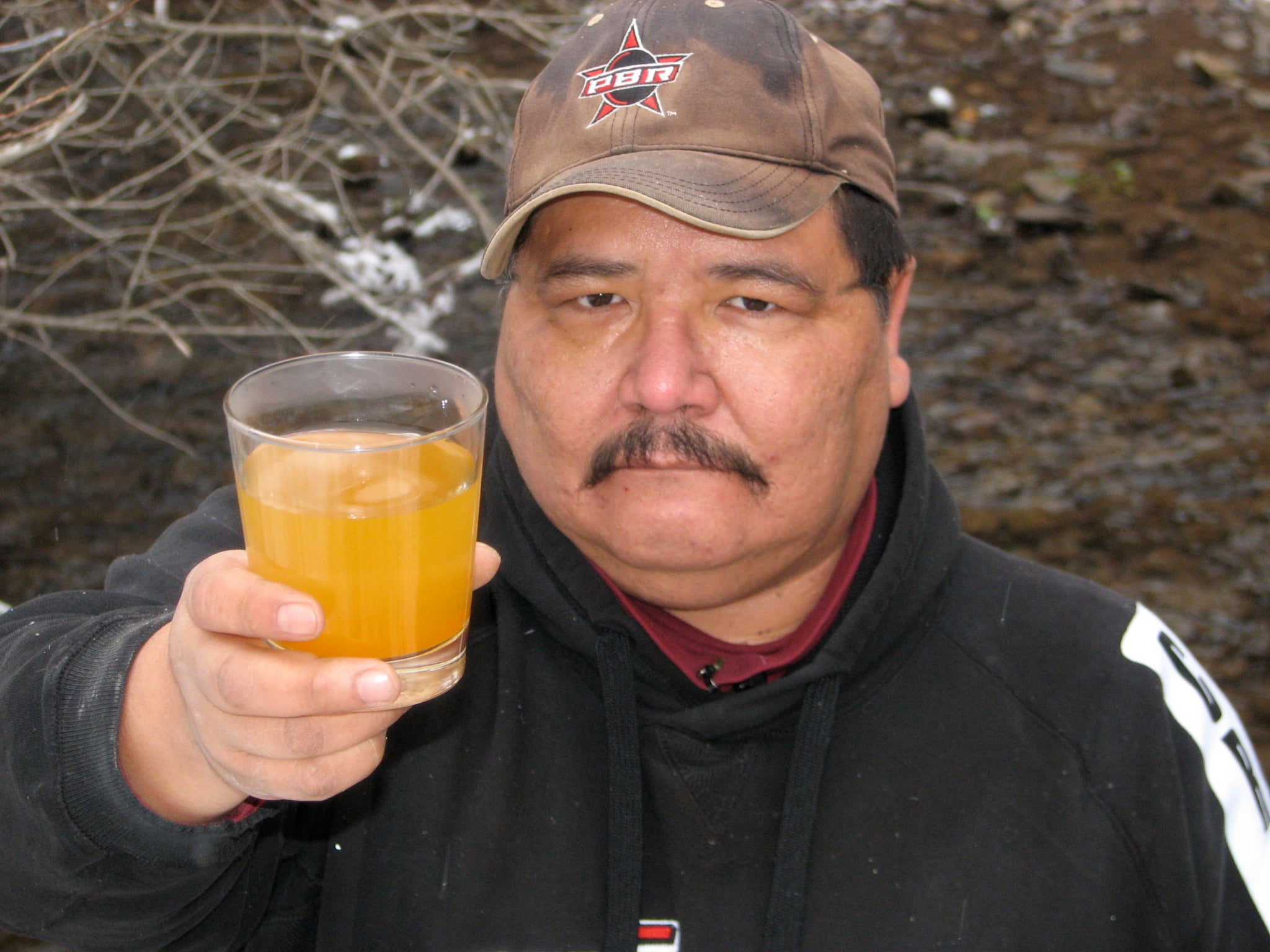Intervention defends Montana DEQ in its challenge to illegal mining at Zortman gold mine
CONTACTS
Amanda Galvan, Earthjustice, (406) 586-9699, agalvan@earthjustice.org
Derf Johnson, MEIC, (406) 581-4634, djohnson@meic.org
David Brooks, Montana Trout Unlimited, (406) 543-0054, david@montanatu.org
Bonnie Gestring, Earthworks, (406) 546-8386, bgestring@earthworks.org
Jackson Chiappinelli, Earthjustice, (585) 402-2005, jchiappinelli@earthjustice.org
 Dean Stiffarm of Fort Belknap, Mont., holds a glass of water contaminated by the Zortman-Landusky mines. (Earthworks)
Dean Stiffarm of Fort Belknap, Mont., holds a glass of water contaminated by the Zortman-Landusky mines. (Earthworks)
MALTA, MO — The Fort Belknap Indian Community and three conservation groups today filed a motion to intervene in defense of a Montana Department of Environmental Quality (DEQ) enforcement action against two miners who illegally mined within the Zortman-Landusky Reclamation Area, where tens of millions in public funds have been spent to address ongoing pollution from the defunct Zortman and Landusky Mines in the Little Rocky Mountains. This mining activity threatens to exacerbate environmental harm in an area of profound cultural significance to the Fort Belknap Indian Community. The Gros Ventre and Assiniboine Tribes have faced an extreme environmental justice burden from the mines for decades.
“The Fort Belknap Indian Community Council has continuously monitored the activities near our sacred sites and were forced to take legal action in Luke Ployhar’s and Owen Voigt’s latest effort to mine the area. Their intentional and deliberate disregard of the state’s mining permitting process further shows their bad faith efforts and determination to push their profit driven agenda. There is no regard for the letter of the law, the environment, or spiritual beliefs,” said President Jeffrey Stiffarm of the Fort Belknap Indian Community. “Our Gros Ventre and Assiniboine beliefs and responsibilities are to protect our traditional and spiritual lands and react as good stewards of the land. Even though the current boundaries are drawn by non-Indian laws, our ancestral lands include the mined area, and the pollution created by mining will flow onto Fort Belknap Indian Reservation lands. We, as a Council, are entrusted and charged with the responsibility to protect the land.”
DEQ brought an enforcement action in April 2023 against Luke Ployhar, Owen Voigt, and their respective companies after Ployhar and Voigt attempted to circumvent the Montana permitting process by illegally mining at the former Zortman mine site. DEQ has requested $512,767 in fines and permanent injunctive relief, and to prohibit Ployhar, Voigt, and their companies from future mining until the disturbances are reclaimed and the penalties are paid. In 2022, DEQ required Ployhar to complete an environmental impact statement (EIS) on the cultural impacts of mining the Zortman site, but later discovered that Ployhar and Voigt had already charged forward without the requisite authorization. Tribes and conservation groups had previously challenged DEQ’s approval of a different mining exploration license of Ployhar’s at the site, which is currently stayed in Phillips County District Court.
“There must be consequences for this type of irresponsible and dangerous behavior,” said Bonnie Gestring, Northwest program director at Earthworks. “They’ve demonstrated complete disregard for the decades of reclamation work to control acid drainage and improve water quality for downstream communities.”
The Zortman mine is part of the broader Zortman-Landusky mining complex in the Little Rocky Mountains. The site has left a legacy of persistent toxic pollution, disproportionately impacting tribal members’ land and water for decades. The Little Rocky Mountains were once entirely within the boundaries of the Fort Belknap Indian Reservation, but when gold was discovered in the 1880s, the federal government pressured the Tribes to cede the gold-bearing areas to the United States. The Zortman and Landusky mine sites are currently surrounded on three sides by the Fort Belknap Indian Reservation.
“Montana has laws regulating its mining operations for a reason,” said Amanda Galvan, senior associate attorney with Earthjustice’s Northern Rockies Office. “This site is home to one of the worst environmental justice disasters in our state history, and for a miner to come in and illegally charge forward without a permit is both brazen and intolerable. DEQ is right in bringing an enforcement action against Ployhar and Voigt, and we will stand alongside the agency in demanding accountability.”
“We’re glad to see that DEQ is pursuing an enforcement action against the reckless and unlawful conduct by these fly-by-night miners,” stated Derf Johnson, Deputy Director of the Montana Environmental Information Center. “Hopefully this also sends a signal to other hardrock miners in the state: follow the laws or have them enforced against you.”
“Flagrantly breaking Montana’s mining laws is unacceptable, especially when this type of violation harms significant cultural, fishery, and clean water resources, as well as undermines decades and millions of taxpayer dollars worth of reclamation work,” said David Brooks, executive director of Montana Trout Unlimited. “We fully support DEQ’s enforcement, as it helps protect FBIC and public resources.”
The Zortman and Landusky mines were operated for nearly three decades as open-pit, cyanide heap-leach mines. The heap-leaching process occurred at two locations in the Little Rocky Mountains and destroyed much of the land. When in operation, cyanide and acid mine drainage contaminated surface and ground waters hydrologically connected to the mines. In 1998, the mine operators declared bankruptcy and left behind a drastically underfunded clean-up effort, which has largely been shouldered by taxpayers.
Now that mining has ceased, acid mine drainage and other contaminants like cyanide, selenium, and nitrates continue to pollute the surface and groundwaters connected to the mines, including waters flowing into the Reservation. The contaminants will perpetually pollute surface and groundwaters if the water is not continually treated. Even with treatment, a plume of contaminants continues to creep into Reservation lands, including near key cultural sites and the Fort Belknap Tribes’ powwow grounds.
Earthjustice is representing the Fort Belknap Indian Community, Montana Environmental Information Center, Montana Trout Unlimited, and Earthworks in the intervention.

